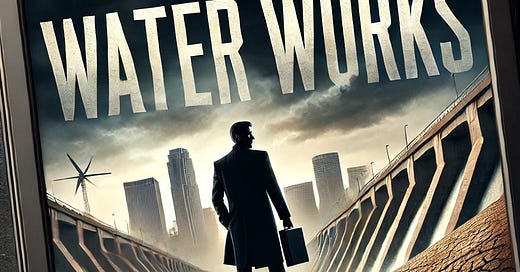12.
"Two things, Pikestaff."
I had crossed the Atlantic and we are back at the Cosmos Club quaffing cocktails.
"One, I need a crash course on water. Judging by the professional journals in Dulci Acqua's Monaco office, water is more complicated than I thought. I need to know something about water treatment before I see mom and pop in Kyrgyzstan."
"Fine," says Pikestaff.
"Do you have anyone at Langley who knows water?"
"It's better if you find someone in the private sector who understands profit-making."
"Yeah, I thought not. Thing two: I need to set up an office. One of those fully-serviced accommodation deals."
"Why?"
"I told them I'm based in DC. I ought to have an office to back-stop it."
"Okay, do that, too."
"Thing three..."
"Hold on, you said two things."
"Yeah, but we're doing so well I might as well keep going."
Pikestaff taps the arm on his chair, doesn’t smile. "So, what's number three?"
"I need to outfit the office with a bar and cable TV."
Pikestaff harrumphs.
"Is that a yes?"
"No."
"C'mon, Pikestaff. We need a place to hang out."
"I have one. This club."
"How can you hang out with a knot tied around your neck cutting off your circulation?"
"I'm not listening to this." Pikestaff covers his ears. "No to thing three."
"Okay, thing four..."
"No, no, no. You've already got me addicted to Pepcid AC. Just go."
Not 24 hours later, I have an office with a view of Sutton Place near American University. I have a telephone; a built-in telephone operator—not as sexy as Mademoiselle Legs in Monaco, but efficient—and she answers my line Enki Group. I have voice mail and support services including a fax machine.
Now it’s time to play with Monsieur Sieff.
I pick up my new phone and touch-key Monaco.
"'allo, oui?" Mademoiselle Legs.
"Jay Sandak for Armand."
“'old please."
"I'd like to 'old your ankles,” I say this into a fiber optic void, “around my neck."
"Jay." A renewed warmth in Sieff’s voice isn’t destined to last.
"Hey buddy," I say. "You're not going to believe this. We've got a new mousetrap that's going to revolutionize the water treatment industry!"
"Really?" He sounds numb.
"The down side is, I have to put our investment deal on a backburner. I'm really sorry about that. Now, I'm not saying we've lost interest completely, only that we're not going to execute a contract at this time. Maybe later, Armand—that is, if you're still talking to me."
Armand is silent. He already isn’t talking to me.
"There's an up-side to this," I add.
"An up-side?" The warmth is gone.
"Sure, buddy. I want you guys to have a piece of this—like you were willing to do for me." I pause. "I still think we'd make a dynamic team."
"We'll see," says Sieff. Now his tone is below freezing. "I have to go."
13.
Emil Rubitski greets me without getting up. He has grown thick roots beneath his desk at the flatulent Strategic Study Center on K Street.
To his credit, Emil is one of the few Great Ponderers who had not bought his seat—or had it bought for him with special interest money. This was the Beltway Bog's version of the stock exchange. In New York, the game is money; in Washington, the game is influence, which often translates to money.
I want to go out and eat something ethnic, but I knew Emil would have none of it. His life revolves around his suburban home, his corner office—and the International Club one floor below. The only other place he'd consider integrating into is the White House. But that call hasn’t come, and everyone knows it will never come. Everyone except Emil.
Greek, Emil?"
The Great Ponderer looks at me as if I’d lost my mind. "Is the International Club okay?" He doesn’t wait for an answer, but turns to retrieve his coat from a hanger on the door.
One floor down, Emil’s regular table is inexplicably occupied.
"I'm sorry, Dr. Rubitski," the maitre ‘d' practically falls over himself in sorrow. "It's late and I thought you were not coming today."
Emil grumbles all the way to a substitute table. "Thought I wasn't coming," he mutters. "I'm here every day, for crying out loud."
This is how Rubitski distinguishes a good day from a bad day.
"Emil," I say, after we order libations. "who at your think-tank knows anything about water?"
Rubitski considers this. "We had someone. He's running AID now. I could..."
"No. Someone who knows the money-making side of water, not money-spending."
"The people around here are a lot better at spending."
"So, the question is, who might you know outside of here?"
"An old colleague of mine runs Aquatech," he says.
"What’s Aquatech—some kind of swimming pool company?”
"No. Water treatment."
"Perfect. Where are they?"
"New Mexico."
"What the hell they are doing way out there?"
"Way out there, as you put it, is where most of the action is—in this country anyway," replies Rubitski. "New Mexico. Nevada. Arizona. Colorado. California. Their populations are growing faster than the water supply can keep up. My friend started Aquatech when he got tired of building bombs."
"He's at Los Alamos?"
"Not far. Santa Fe."
"Okay, Emil. Could you call him and arrange an introduction?"
"What's the basis for this?"
"I'm in the water biz."
Rubitski smirks.
I pass Emil a card. "Me and Morton Levi. Heard of him?"
His smirk disappears. It’s guys like Morton Levi who keep places like Emil’s think-tank in black ink. "I'll call Stefan this afternoon."
"Stefan?"
"Stefan Zagora. He's originally from Bulgaria. How soon do you want to see him?"
"I'm on my way to Santa Fe the moment you say git."
Two hours later, Rubitski says git.




